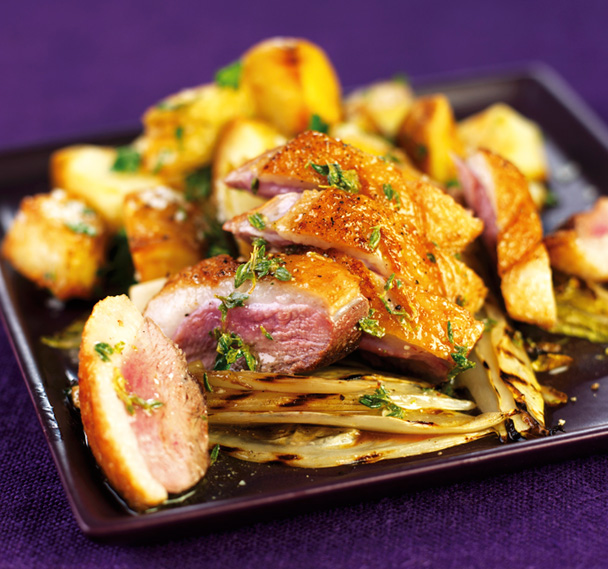
Losing 15 pounds in three months was not my intention when I embarked on an entirely new approach to eating two years ago. I was on the slim side to begin with. Sure, I wouldn’t have minded a little butt reduction, but I was more interested in assessing and optimizing my health.
It wasn’t that I felt ill. If you’d asked me, I would have said I felt fine. I swam half a mile three times a week, worked full-time, and although often tired, I figured that was normal, given my schedule. Frequent eruptions of gas in the form of burps and even depth charge belches had been with me for so long, I just laughed them off. It’s because my husband, Bill (a pushover for any new alternative health regimen), felt like a new man after he began seeing a naturopath that I became curious to see what the fellow would recommend for me.
After an hour-and-a-half consultation and extensive blood work, I got the verdict: My digestion was a shambles. Not a surprise, considering I had worked in Gourmet’s test kitchen for the better part of three decades. So I joined my husband in the 12-week program the naturopath termed an “environmental detox.” Laid out in 47 pages of detailed instructions that took days to mentally digest, the regimen involved quite a bit more than a change in food intake. But it was the diet—general rules tailored to each individual’s health issues—that totally upended everything I’d learned about cooking and eating in my long career of testing and developing recipes.
Just Say No
To begin with, there was a mind-numbing list of prohibitions:- No sugar: The only sweetener allowed was a teaspoon or two of maple syrup or honey—less if fruit was on the menu.
- No dairy: A teaspoon of butter per day was the only exception (I used more).
- No wheat: Not to be confused with going gluten-free, wheat alone was banned.
- No nightshades: This classification spans thousands of plants, including some of the most beloved Mediterranean ingredients, such as tomatoes, bell peppers, and eggplant. Potatoes are a nightshade as well, but we were allowed them with fish and eggs.
- No pork, beef, veal, or lamb
- No shellfish
- No caffeine except green tea
- No alcohol
More Food Rules
The naturopath’s regimen didn’t stop at eliminations. It prescribed when and how to combine the foods you could eat.- Do not mix a starchy complex carbohydrate with an animal protein: In other words, no meat and potatoes (or turkey sandwiches, or morning cereal with milk)! And no rice, pasta, grains, legumes, or white potatoes with any animal protein except fish and eggs.
- Do not mix a starchy complex carbohydrate with fruit: That meant no more fresh fruit on cereal, either, and no toast with jam.
- Eat fruit 20 minutes before a complex carbohydrate or two hours after: Keeping track of what I ate when was too much for me, so I often skipped fruit except for the occasional late-afternoon banana.
- Mix whole grains with legumes, seeds, or nuts to boost vegetable protein: Hello, beans and rice (minus the bacon and sausage I love to add for smoky, savory flavor). The only white rice allowed was good-quality basmati imported from India.
- Practice variety, rotation, and moderation: Breakfast became an ever-changing round of hot quinoa, millet, and amaranth (our new favorite) along with the occasional bowl of our old standby, oatmeal. Cooked in water with a cinnamon stick and drizzled with maple syrup or honey and almond milk, these hot grains are still the best start to our day.
What Was Left to Eat?
Initially, I threw my hands up in despair at this diet, but in time I discovered a wealth of foods to enjoy, many of which I’d neglected over the years.- Duck: Medium-rare duck breast, fat and all, was the only red meat allowed. It became our “steak,” and we treated ourselves to it once a week. Confit duck legs were another option, but duck breast won out.
- Other poultry and game: We stuck to chicken and turkey, though quail, pheasant, and rabbit were also permitted.
- Fish: Many types were recommended, among them cod, halibut, mahi mahi, wild salmon, and octopus.
- Vegetables: Lots and lots of them, raw or cooked! Locally grown and organic were best.
- Toast: Since wheat was ruled out, we switched to heavy, dense German-style 100% rye bread. Toasted and spread with butter or almond butter, it’s so delicious, we’re still hooked.
- Water from a high-quality filter
- Celtic sea salt: The naturopath said it was chemically similar to human blood, rich in electrolytes and minerals.



 Pinterest
Pinterest


